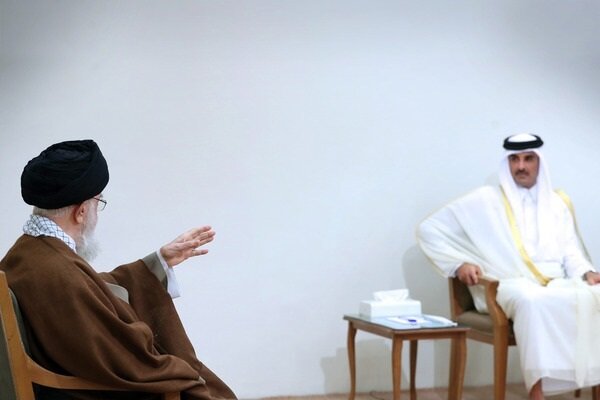Iran lays out plan for cooperation in the region

TEHRAN – During the visit of Sheikh Tamim bin Hamad Al Thani, the Emir of Qatar, to Tehran, Iranian officials laid out the plan to use the trip to achieve peace and security in the West Asia region.
The emir of Qatar paid a visit to Iran on Thursday at a delicate moment in terms of regional security and negotiations over the 2015 Iran nuclear deal, formally known as the Joint Comprehensive Plan of Action (JCPOA). In Tehran, the Qatari emir discussed a variety of bilateral, international, and regional issues with Iranian officials. Among all the issues discussed during the visit, regional peace and security stood out in the readouts from Sheikh Tamim’s meetings with Iranian President Seyed Ebrahim Raisi and Leader of the Islamic Revolution Ayatollah Seyed Ali Khamenei.
The Qatari-Iranian discussions over regional security brought to the surface Iran’s views and approach to resolving the challenges facing the West Asia region. Judging from the statements put out after Sheikh Tamim’s meetings, Iran’s approach to achieving peace and security seems to rest on two pillars: non-interference of foreign powers in the region and dialogue between the regional countries.
These two notions were especially emphasized by the Leader in his meeting with the emir of Qatar. Ayatollah Khamenei stated that the way to resolve regional issues must be sought without the interference of foreign elements, according to the khamenei.ir.
He added that the solution to regional issues is in the hands of regional countries and this solution should be sought through dialogue.
The Leader noted, “The issues of Syria and Yemen too can be resolved through dialogue. Of course, dialogue should not take place from a position of weakness while the other side – primarily the U.S. and others – rely on their military and financial power.”
Underlining the disadvantages of bringing Israel in, Ayatollah Khamenei said, “We the countries of the region must strengthen our relations as much as possible through cooperation and consultation.”
The theme of the meeting between Raisi and Sheikh Tamim also centered around regional peace and security. In his meeting with the Qatari emir, Raisi spoke of the capacity of Iran-Qatar relations to serve as a “platform to address the challenges in the region.”
He emphasized the detrimental effect of Western intervention in the region on regional security. Underlining the importance of resolving regional issues, Raisi said, “Iran and Qatar stressed that the intervention of foreign and Western countries in the region will be detrimental to regional security.”
The emir of Qatar, for his part, underlined the identical positions of Iran and Qatar on regional issues, saying, “We are ready to continue developing cooperation on Syria, Iraq, Palestine, Yemen and Afghanistan.”
Referring to Iran's important role in various regional issues, Sheikh Tamim added, “It is necessary to protect the security and dignity of the nations of the region and the right to self-determination, but foreign interference has disrupted the living conditions in some countries in the region.”
Iran’s approach toward how to resolve the challenges of the region indicates remarkable continuity. The Raisi administration’s approach toward the region seems in line with the HOPE initiative the previous administration presented for resolving regional differences which also highlighted the need for dialogue between the region’s countries and rejecting foreign interference in the region.
